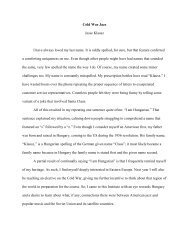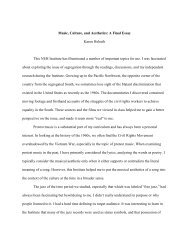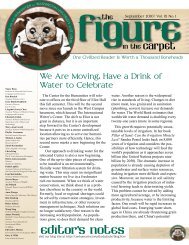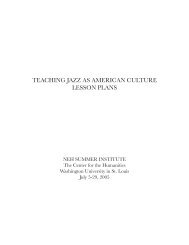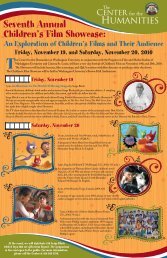You also want an ePaper? Increase the reach of your titles
YUMPU automatically turns print PDFs into web optimized ePapers that Google loves.
Speaking to Both Children <strong>and</strong> Genre 137appeared interspersed with her science fiction novels,” <strong>and</strong> so “it is notsurprising . . . that her fantasies share <strong>the</strong> same concerns as her sciencefiction” (165); David Galef argues that <strong>the</strong>matic parallelism is seen in anumber of “cross-over” writers as well (29). Le Guin’s shared set of<strong>the</strong>mes (freedom, home, journey, identity, o<strong>the</strong>rness as seen in <strong>the</strong> beast<strong>and</strong> alien, <strong>and</strong> <strong>the</strong> courage to construct a self in <strong>the</strong> world) surface in all ofher writing; <strong>the</strong>y are merely articulated in different contexts. PerryNodelman reminds us that “many readers, both children <strong>and</strong> adults, seekout fur<strong>the</strong>r texts by authors <strong>the</strong>y have enjoyed, because <strong>the</strong>y expect acommon thread, a consistency in subject <strong>and</strong> style, in all <strong>the</strong> texts anauthor produces” (145). This is certainly true of Le Guin’s readers.Readers of <strong>The</strong> Dispossessed follow Le Guin to Always Coming Home,perhaps to come home in different ways in different genres; <strong>the</strong> youngreaders of A Ride on <strong>the</strong> Red Mare’s Back will find in Ged’s story <strong>and</strong> <strong>the</strong>nin Shevek’s those same concerns about always coming home, though <strong>the</strong>ytravel from folklore to high fantasy to science fiction to get <strong>the</strong>re.However, given <strong>the</strong> clear generic alliances Le Guin makes betweenfantasy <strong>and</strong> realism (traditional or science fiction) <strong>and</strong> age, her “approachesto <strong>the</strong> <strong>the</strong>mes vary considerably” (Attebery 166).Though genre isn’t a barrier to Le Guin’s <strong>the</strong>mes, genre is an influencefelt from her earliest foray into children’s literature with <strong>the</strong> publication ofA Wizard of Earthsea. Her entry into <strong>the</strong> realm of heroic fantasy with <strong>the</strong>Earthsea series was allowable, she observes, because <strong>the</strong>y were publishedas children’s books. “So long as [she] behaved [herself], obeyed <strong>the</strong> rules,[she] was free to enter <strong>the</strong> heroic realm” (Earthsea Revisioned 7). Le Guinfound that she needed to challenge genre’s influence in order to speak asherself. Until she realized she was <strong>the</strong> mouthpiece of tradition, sheconfused security with freedom; once she realized this, she says, <strong>the</strong> longsuccession of “genre-busting” texts began—texts for adults, that is. As awriter writes within a given genre, “she begins to write against <strong>the</strong> genre,thus changing <strong>and</strong> renewing it. <strong>The</strong> rigid system of genres <strong>and</strong> modes[begins] to disintegrate” (Nikolajeva 7). By bucking tradition, Le Guingives up <strong>the</strong> authority vested in her as a duly appointed officer oftraditional genres <strong>and</strong> creates a new authority for herself. Always ComingHome defies demarcation; Malafrena asks us to consider a fictitiouscountry in a Europe we know. Although she claims that “people arewriting differently <strong>and</strong> <strong>the</strong> genres are all merging” (Walsh, “I Am aWoman Writer” 198), her children’s literature remains fairly genrefaithful.She simultaneously plays with genre in her adult texts whilerespecting <strong>the</strong> integrity of <strong>the</strong> children’s literature/fantasy relationship.So, despite all of her “genre-busting,” Le Guin keeps genre clear in her



